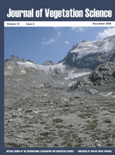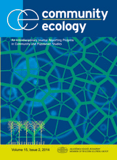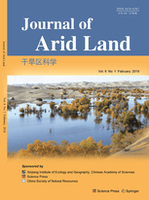
JOURNAL OF VEGETATION SCIENCE
Scope & Guideline
Fostering critical discussions on ecological implications.
Introduction
Aims and Scopes
- Plant Community Dynamics:
The journal emphasizes the study of plant community dynamics, including succession, stability, and the impacts of disturbances. This encompasses research on how communities respond to environmental changes over time. - Biodiversity and Ecosystem Functioning:
A core area of research is the relationship between biodiversity and ecosystem functioning. The journal publishes studies that explore how plant diversity contributes to ecosystem processes such as productivity, stability, and resilience. - Functional Traits and Species Interactions:
Research on functional traits and their role in species interactions and community assembly is a significant focus. The journal highlights studies that investigate how traits influence competition, facilitation, and overall community structure. - Environmental Influences on Vegetation:
The journal covers research on the influence of abiotic factors such as climate, soil, and topography on vegetation patterns. This includes studies that examine how these factors drive species distribution and community composition. - Ecological Restoration and Conservation:
The journal contributes to the field of ecological restoration and conservation by publishing studies that address the impacts of human activities on vegetation and strategies for restoring degraded ecosystems. - Global Change and Vegetation Responses:
Research addressing the impacts of global change, including climate change and land-use change, on vegetation dynamics is a key area. The journal seeks to understand how plant communities adapt or decline in response to these pressures.
Trending and Emerging
- Climate Change Impacts on Vegetation:
There is a growing emphasis on research that examines the impacts of climate change on plant communities, including shifts in species composition, diversity, and ecosystem functions. This trend highlights the urgent need to understand and mitigate the effects of climate change on biodiversity. - Functional Trait Variation and Community Assembly:
Studies focusing on functional trait variation and its role in community assembly are on the rise. Researchers are exploring how intraspecific and interspecific trait variations influence species interactions and community dynamics. - Biodiversity and Ecosystem Services:
An emerging theme is the link between biodiversity and ecosystem services, where studies are increasingly addressing how plant diversity contributes to ecosystem functions and human well-being, emphasizing the socio-ecological connections. - Longitudinal Studies and Resurvey Projects:
There is a trend towards longitudinal studies and resurvey projects that assess changes in vegetation over time. These studies provide valuable insights into ecological dynamics and the long-term effects of environmental changes. - Integration of Remote Sensing and Ecological Modeling:
The use of remote sensing technologies and ecological modeling approaches is growing, allowing for more comprehensive assessments of vegetation patterns and dynamics across large spatial scales.
Declining or Waning
- Traditional Taxonomic Studies:
There is a noticeable decline in studies that focus solely on traditional taxonomic classifications without integrating functional or ecological aspects. The journal is increasingly favoring research that connects taxonomy with ecological processes. - Single-Species Focus:
Research that emphasizes single-species studies is waning in favor of more holistic approaches that consider community interactions and ecosystem-level dynamics. This reflects a broader trend towards understanding ecological relationships rather than isolated species. - Static Vegetation Surveys:
The frequency of publications based solely on static vegetation surveys without considering temporal dynamics or environmental changes is decreasing. The journal is prioritizing studies that incorporate long-term monitoring and dynamic ecological modeling. - Descriptive Studies with Limited Ecological Insight:
There appears to be a reduction in descriptive studies that do not provide deeper ecological insights or applications. The journal is increasingly focused on research that offers theoretical or practical implications for vegetation science.
Similar Journals

OIKOS
Advancing ecological knowledge for a sustainable future.OIKOS is a leading journal dedicated to the field of Ecology, Evolution, Behavior, and Systematics, published by WILEY in the United Kingdom. Since its inception in 1973, OIKOS has established itself as a vital platform for researchers seeking to advance their understanding of ecological interactions and evolutionary processes, with its impact reflected in its prestigious Q1 classification in the 2023 Scopus rankings. The journal's dedication to high-quality research is exemplified by its robust ranking of #106 out of 721 in the relevant categories, situating it within the top 15% of journals globally. With a commitment to disseminating influential findings, OIKOS encourages the open exchange of ideas among a diverse range of scholars, making it an essential resource for academics, professionals, and students alike. Whether you are interested in innovative ecological theories or applied research with real-world implications, OIKOS provides a rich repository of knowledge to inform and inspire your work.

ECOGRAPHY
Advancing Ecological Insights for a Sustainable FutureECOGRAPHY, published by WILEY, stands at the forefront of ecological and evolutionary research, with an impressive Impact Factor reflecting its esteemed position in the Q1 category of Ecology, Evolution, Behavior, and Systematics. Operating since 1978 and transitioning to a fully Open Access model in 2020, the journal is dedicated to disseminating high-quality research that influences conservation practices and enhances our understanding of ecological dynamics. With an ISSN of 0906-7590 and an E-ISSN of 1600-0587, ECOGRAPHY has garnered a remarkable placement in Scopus rankings, being in the top 4% of its category, achieving an impressive rank of #27 out of 721 in Agricultural and Biological Sciences. Academics from around the globe benefit from the research published in this journal, which seeks to engage and inspire further exploration of ecological systems. For inquiries, ECOGRAPHY can be reached at their UK address: 111 River St, Hoboken 07030-5774, NJ.

Forest Ecosystems
Advancing knowledge for a sustainable future.Forest Ecosystems is a prestigious open access journal published by KEAI PUBLISHING LTD, dedicated to advancing knowledge in the fields of forestry, ecology, and conservation. Established in 2014 and located in Beijing, China, this journal has rapidly gained prominence, achieving Q1 status in multiple categories, including Ecology, Evolution, Behavior and Systematics, and Forestry in 2023. With an impressive rank of 19 out of 174 in the Scopus category of Agricultural and Biological Sciences - Forestry, it stands in the 89th percentile, reflecting its influential contributions to the field. The journal fosters scholarly discourse and disseminates innovative research aimed at understanding forest ecosystems and their vital role in our environment. Offering a robust platform for researchers, professionals, and students, Forest Ecosystems ensures accessibility through its open access format, enabling a wider audience to engage with and benefit from cutting-edge research dedicated to the stewardship of forest resources.

COMMUNITY ECOLOGY
Unraveling the Tapestry of Ecological NetworksCOMMUNITY ECOLOGY is a distinguished journal published by Springer Heidelberg that focuses on the intricate dynamics of ecological interactions within communities. Established in 2000 and continuing robustly through to 2024, this journal aims to disseminate significant research findings that contribute to the understanding of ecological processes, species interactions, and community structures. With an ISSN of 1585-8553 and an E-ISSN of 1588-2756, the journal holds a commendable position in the academic sphere, reflected in its Q2 quartile rankings in the categories of Ecology and Ecology, Evolution, Behavior and Systematics. It boasts an impressive Scopus ranking within the 57th percentile for both Agricultural and Biological Sciences and Environmental Science fields, attesting to its relevance and influence. Though it does not currently operate under an open access model, COMMUNITY ECOLOGY remains a vital resource for researchers, professionals, and students eager to advance their knowledge in community ecology, highlighting the importance of collaborative research in addressing ecological challenges globally.

Neotropical Biodiversity
Connecting global minds through Neotropical ecological research.Neotropical Biodiversity is a prominent journal dedicated to advancing our understanding of biodiversity and ecological dynamics within the Neotropical region. Published by TAYLOR & FRANCIS LTD in the United Kingdom, this Open Access journal has been providing unrestricted access to research findings since 2015, fostering collaboration and knowledge sharing among the global scientific community. With an emphasis on innovative research in Ecology, Ecology, Evolution, Behavior and Systematics, and Global and Planetary Change, it has earned a reputation for excellence, currently holding a Q3 category in its field. As of 2023, the journal ranks in the 37th percentile for Environmental Science (Ecology) and in the 36th percentile for Agricultural and Biological Sciences (Ecology, Evolution, Behavior and Systematics), making it a valuable resource for researchers, professionals, and students interested in understanding and preserving biodiversity in one of the world's most diverse ecosystems. We invite you to explore the cutting-edge research published in Neotropical Biodiversity and contribute to the ongoing dialogue for environmental sustainability and ecological resilience.

ECOLOGY LETTERS
Exploring the depths of ecological science for a sustainable tomorrow.ECOLOGY LETTERS, published by Wiley, is a premier journal dedicated to advancing the field of ecology and related disciplines. Renowned for its rigorous peer-review process and impactful research contributions, the journal boasts an impressive Scopus Rank of #13 out of 721 in the category of Agricultural and Biological Sciences, positioning it in the 98th percentile globally. With a Q1 rating in the 2023 quartile rankings for Ecology, Evolution, Behavior and Systematics, it serves as an essential platform for ecologists and evolutionary biologists to disseminate cutting-edge research findings from 1998 to 2024. Although not an open-access journal, ECOLOGY LETTERS actively contributes to the global ecology discourse, making it a critical resource for researchers, professionals, and students dedicated to understanding complex ecological interactions and evolutionary processes.

Journal of Arid Land
Fostering interdisciplinary dialogue on arid land management.Journal of Arid Land, published by SPRINGER HEIDELBERG, is a pivotal platform dedicated to advancing knowledge in the fields of Earth-Surface Processes, Management, Monitoring, Policy and Law, and Water Science and Technology. With an ISSN of 1674-6767 and an E-ISSN of 2194-7783, this journal stands out as a prominent source of scholarly research focusing on the unique challenges and opportunities of arid and semi-arid environments, particularly relevant in the context of global climate change. As of 2023, it holds a commendable Q2 ranking in several critical categories, underscoring its impact in environmental science and related disciplines. The journal, which has been in publication since 2009 and is set to continue through 2024, provides unrestricted access to high-quality research that sheds light on sustainable practices and effective policies. With its focus on arid lands, the Journal of Arid Land plays an essential role in fostering interdisciplinary dialogue among researchers, practitioners, and policymakers striving to address the pressing issues faced by these ecosystems.

PHYTOCOENOLOGIA
Connecting Researchers in Plant SciencePHYTOCOENOLOGIA, published by GEBRUDER BORNTRAEGER, is a prominent journal in the field of Plant Science, holding a prestigious position in the academic landscape with a 2023 Scopus rank of #235 out of 516 in its category, reflecting its contributions to agricultural and biological sciences. Since its inception in 1987, the journal has provided a vital platform for researchers, offering insights and disseminating advances in phytoecology and related disciplines. With its strong commitment to quality, PHYTOCOENOLOGIA is classified in the Q3 quartile, making it a valuable resource for professionals and students alike. The journal welcomes diverse research articles, reviews, and case studies that enhance our understanding of plant communities and their ecological dynamics. Although it operates under a traditional access model, it continues to foster a collaborative environment for scholars eager to explore critical issues in plant science.

WEB ECOLOGY
Illuminating the Pathways of Web-Driven EcosystemsWEB ECOLOGY is a premier academic journal published by COPERNICUS GESELLSCHAFT MBH, specializing in the field of Ecology, with a specific emphasis on the intricate interrelations between web-based ecosystems and environmental factors. Since its inception in 2000, this Open Access journal has provided an invaluable platform for researchers, professionals, and students to disseminate and access cutting-edge research findings. Currently based in Germany, WEB ECOLOGY has garnered a significant reputation, evidenced by its prestigious Q2 quartile ranking in both Ecology and Ecology, Evolution, Behavior and Systematics as of 2023. Furthermore, its impressive Scopus rankings, placing it within the top quartiles of its categories, highlight its relevance and influence in the field. With comprehensive coverage from 2000 to 2024, the journal aims to foster dialogue and innovation in ecological research, making significant contributions to our understanding of web ecology and inviting submissions that push the boundaries of current knowledge.

FOLIA GEOBOTANICA
Exploring the intricate connections between flora and fossil.FOLIA GEOBOTANICA, published by Springer, is a distinguished journal dedicated to advancing the fields of Paleontology and Plant Science through the dissemination of high-quality research. With an ISSN of 1211-9520 and an E-ISSN of 1874-9348, this journal has been pivotal in providing a platform for innovative studies from 1994 to 2024. Notably, FOLIA GEOBOTANICA holds a Q3 ranking in Paleontology and a Q2 ranking in Plant Science as of 2023, affirming its relevance and contribution to the scholarly community. The journal is located in the Netherlands at VAN GODEWIJCKSTRAAT 30, 3311 GZ DORDRECHT, and is not an Open Access publication, ensuring comprehensive review processes and scholarly integrity. With Scopus rankings that place it in the 50th percentile for Plant Science and 46th for Paleontology, FOLIA GEOBOTANICA continues to attract researchers, professionals, and students who are keen to explore the intricacies of plant ecology and fossil records, thereby fostering a deeper understanding of ecological and evolutionary patterns.